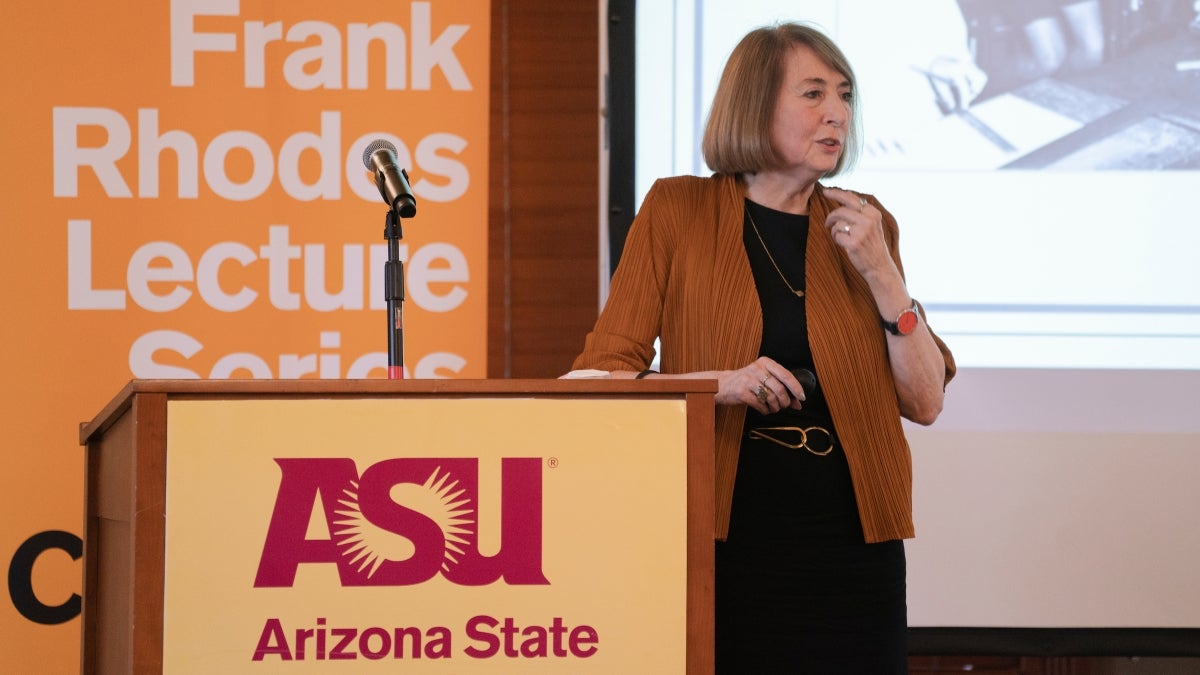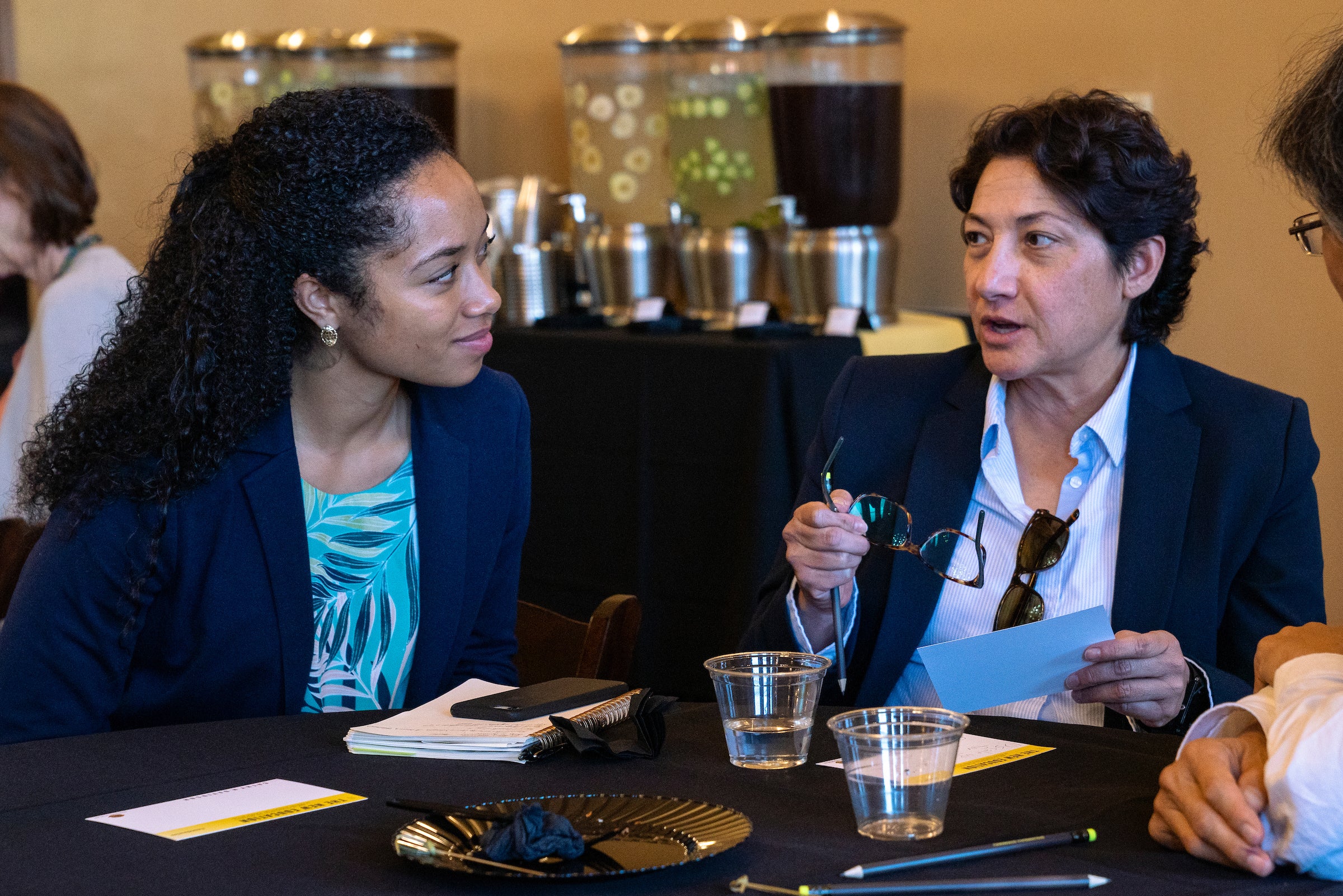Giving all students a voice is key to more effective higher education

Giving students a voice is one of the most radical ideas that a university can do to reform higher education.
Cathy Davidson, a historian of technology and higher-education researcher, said she has transformed all of her classes from lectures into student-led workshops.
“You get everybody to contribute and everybody has a voice,” said Davidson, founding director of the Futures Initiative and a distinguished professor in the PhD program in English at the City University of New York.
Davidson gave the Frank Rhodes Lecture on "The Creation of the Future" at Arizona State University on Tuesday. The lecture series, created in 2011, explores the role of higher education in society.
Davidson, author of “The New Education: How to Revolutionize the University to Prepare Students for a World in Flux,” had the audience in Old Main’s Carson Ballroom write down what they would do to make the world a better place and then discuss the answers with one another.
Afterward, she told them: “It was like recess and you were doing intellectually creative work. I had to fight to get your attention back.
“That’s what education is about. It should feel like that all the time at a university.”
Davidson said that concepts developed in the 1800s and early 1900s still drive much of higher education today, such as the SATs, tenure, graduate school, majors and minors, grading and rankings.
She said that a think tank at Georgetown University is asking tough questions about college:
“What if curriculums were arranged by problems or issues, not disciplines? What if grades and test scores were not the chief measures of success? What if teaching and curriculum were not tied to credit hours or the academic calendar?
“It’s a provocative way of thinking.”
Some of the most successful higher-education innovations have thrown out the traditional methods, she said. For example, the history department at Yale University radically changed its model a few years ago, primarily driven by faculty who were bored. Instead of studying a core curriculum, each class of students works as a cohort, studying issues together, and each course is taught by a team.
“You have a cohesive group not around a fraternity or a sports team but around ideas,” she said. “They think about the purpose of the discipline. ‘Why should I be a historian?’ Those are the big meta questions that I think we’re pretty terrible at.”
Vanessa Pablo, of the EdPlus Success Coach Center, and Yolanda Facio, director of community entrepreneurship, work on a prompt about yearlong goals given to them by Cathy Davidson during her speech at Old Main on Tuesday evening. Photo by Marcus Chormicle/ASU Now
Another innovation is the online master’s degree in digital sociology offered by Virginia Commonwealth University.
“Everyone in the program already has a job in a field that’s changing, such as journalism or nursing.
“They’re looking at the impact of how data is changing their field and they’re understanding what an algorithm is and how an algorithm can embody prejudice and how we can build better data that doesn’t perpetuate discrimination.”
She lauded Hampshire College, which has eliminated standardized test scores from its application.
“The bravest thing about that is that they can no longer be ranked,” she said.
“But by every measure they’ve done, this has proven to be a big success. They have higher yield, increased diversity and a better match of students and their mission.”
Davidson is a proponent of having students collaborate on big ideas as part of their general education, and she pointed out work done by Sha Xin Wei, professor and director of the School of Arts, Media and Engineering at ASU. He had his students work on a project around the question: What will life be like in Phoenix when there’s no more water?
“These are philosophical and political questions that we need to work on together,” she said.
ASU President Michael Crow said that Davidson has worked at all levels of higher education, from selective universities to community colleges.
“She has put this analytical, eagle eye on what we need these institutions to be in the future,” he said.
Crow said that ASU has inverted one traditional concept, that higher education is primarily a vehicle for faculty research, by making the success of students the top priority.
“I think the potential of our species and the potential of all of the learners in our institutions has been only fractionally realized,” he said.
“How do I know that? Because we’ve been able to see what we’ve been able to do with this institutional platform across the full spectrum of our society at all levels of learning and measure and see those differences and be inspired by them.”
Davidson said that she spent time at ASU a few years ago, incognito, talking to students, faculty, staff and community members.
“I was doing ethnographies of universities around the country that were actually doing things, not just talking about them,” she said.
“I’m very impressed by what you’re undertaking here.”
Top photo: Cathy Davidson speaks about revolutionizing higher education at Old Main at the Tempe campus. Davidson spoke as a part of the the Frank Rhodes Lecture on "The Creation of the Future: A Lecture Series for a New American University." Photo by Marcus Chormicle/ASU Now
More Arts, humanities and education
AI literacy course prepares ASU students to set cultural norms for new technology
As the use of artificial intelligence spreads rapidly to every discipline at Arizona State University, it’s essential for students to understand how to ethically wield this powerful technology.Lance…

Grand Canyon National Park superintendent visits ASU, shares about efforts to welcome Indigenous voices back into the park
There are 11 tribes who have historic connections to the land and resources in the Grand Canyon National Park. Sadly, when the park was created, many were forced from those lands, sometimes at…
ASU film professor part of 'Cyberpunk' exhibit at Academy Museum in LA
Arizona State University filmmaker Alex Rivera sees cyberpunk as a perfect vehicle to represent the Latino experience.Cyberpunk is a subgenre of science fiction that explores the intersection of…
